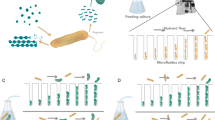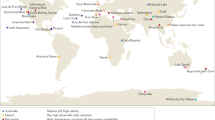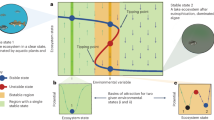Abstract
Background/Question/Methods
Micro-organisms, including Bacteria, Archaea, and Fungi, control major processes throughout the Earth system. Recent advances in microbial ecology and microbiology have revealed an astounding level of genetic and metabolic diversity in microbial communities. However, a framework for interpreting the meaning of this diversity has lagged behind the initial discoveries. Microbial communities have yet to be included explicitly in any major biogeochemical models in terrestrial ecosystems, and have only recently broken into ocean models. Although simplification of microbial communities is essential in complex systems, omission of community parameters may seriously compromise model predictions of biogeochemical processes. Two key questions arise from this tradeoff: 1) When and where must microbial community parameters be included in biogeochemical models? 2) If microbial communities are important, how should they be simplified, aggregated, and parameterized in models? To address these questions, a literature survey was conducted to determine if microbial communities are sensitive to four environmental disturbances that are associated with global change.
*Results/Conclusions*
For all environmental perturbations, community composition changed significantly following disturbance. However, the implications for ecosystem function were unclear in most of the published studies. Therefore, I developed a simple model framework to illustrate the situations in which microbial community changes would affect rates of biogeochemical processes. These scenarios could be quite common, but powerful predictive models cannot be developed without much more information on the functions and disturbance responses of microbial taxa. Small-scale models that explicitly incorporate microbial communities also suggest that process rates strongly depend on microbial interactions and disturbance responses. The challenge is to scale up these models to make predictions at the ecosystem and global scales based on measurable parameters. Meeting this challenge will require a coordinated effort to develop a series of nested models at scales ranging from the micron to the globe in order to optimize the tradeoff between model realism and feasibility.
Similar content being viewed by others
Article PDF
Author information
Authors and Affiliations
Rights and permissions
About this article
Cite this article
Allison, S. Integration of microbial communities into large-scale ecosystem models. Nat Prec (2009). https://doi.org/10.1038/npre.2009.3633.1
Received:
Accepted:
Published:
DOI: https://doi.org/10.1038/npre.2009.3633.1



